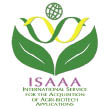The United States remained the primary backer of biotech crop technology in 2011, but adoption has spread internationally. Reports are saying that the GM seed plantings increased eight percent from last year. International Service for the Acquisition of Agri-Biotech Applications (ISAAA) offer a full copy of the report at www.isaaa.org.
 ISAAA is a not-for-profit organization aimed at promoting crop biotechnology applications, which are the subject of controversy, particularly in Europe, where they are largely banned.
ISAAA is a not-for-profit organization aimed at promoting crop biotechnology applications, which are the subject of controversy, particularly in Europe, where they are largely banned.
U.S. farmers have embraced the technology, and most of the U.S. corn and soybeans are genetically altered. Corporate biotech leaders, like Monsanto, have crafted crops that tolerate dousings of herbicides, and crops that are designed to resist pests, effectively creating their own insecticide.
The technology is becoming increasingly popular in Brazil and Argentina, China, India and South Africa, said James. But the United States has by far the largest area of planted genetically altered crops.
The United States plants biotech corn, soybeans, cotton, canola, sugarbeet, alfalfa, papaya and squash. Biotech crops are accepted for import for food and feed use and for release into the environment in 60 countries, including major food importing countries like Japan, which do not plant biotech crops, the ISAAA said.
Visit www.isaaa.org